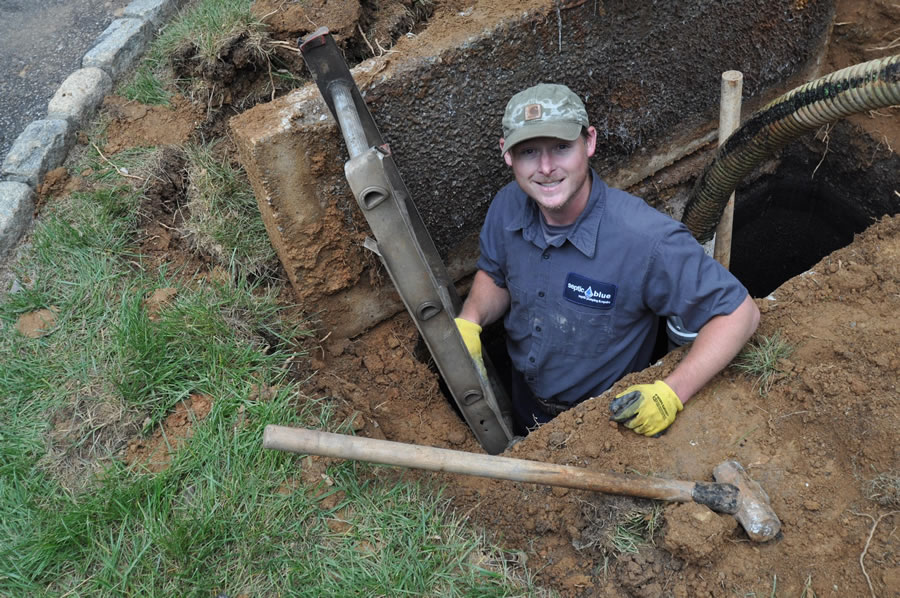Menu
"WE NOT ONLY PUMP YOUR TANK - WE CLEAN IT!"
WE NOT ONLY PUMP YOUR TANK - WE CLEAN IT! Free Septic System Inspection ($99 Value)
Free enzyme treatment - Financing Available
"WE NOT ONLY PUMP YOUR TANK - WE CLEAN IT!"
WE NOT ONLY PUMP YOUR TANK - WE CLEAN IT! Free Septic System Inspection ($99 Value)
Free enzyme treatment - Financing Available
Your septic system is a vital part of your home's wastewater management, and the drain field plays a crucial role in ensuring it functions efficiently. The drain field, also known as the leach field, is responsible for filtering and dispersing the wastewater that exits your septic tank. When properly maintained, it can last for decades, but neglecting it can lead to expensive repairs and even system failure. To keep your drain field in top shape, regular septic pumping, cleaning, and proper care is essential.
 Apr 04, 2025
Apr 04, 2025
In this blog post, our professionals from Septic Blue will talk about the preservation of your septic system and its drain field.
Owning a home comes with…
The drain field is an underground network of perforated pipes that distribute the treated wastewater from your septic tank into the soil. As the wastewater moves through the soil, it undergoes a natural filtration process that removes harmful bacteria and contaminants before reentering the groundwater. If the drain field becomes overloaded or clogged, the entire septic system can back up, leading to unpleasant odors, standing water, and even sewage backups inside your home. Hiring a professional septic company in Auburndale, FL for routine maintenance can prevent these issues.
Recognizing early warning signs of drain field failure can save you time and money. Some common indicators include slow-draining sinks and toilets, foul odors near the drain field, unusually lush or soggy patches of grass, and standing water above the drain field. If you notice any of these signs, it's important to call a septic service right away. Ignoring these problems can lead to severe damage and costly repairs.
One of the most important steps in maintaining your drain field is regular septic pumping. Over time, solid waste accumulates in the septic tank, reducing its capacity and increasing the risk of overflow into the drain field. A professional septic company can assess the condition of your tank and recommend a pumping schedule based on your household size and usage. Most experts suggest pumping your septic tank every three to five years, but this can vary depending on factors such as water usage and the presence of a garbage disposal.
Septic cleaning goes beyond just pumping the tank—it involves thoroughly removing sludge and debris that may be lingering in your system. Regular septic cleaning ensures that solid waste does not build up and clog your drain field. When waste is not properly cleaned out, it can seep into the leach lines, leading to system failure. A professional septic service can perform a deep cleaning to keep your septic system running smoothly.
Excessive water use can put unnecessary strain on your drain field. If too much water flows into the septic tank too quickly, it can overwhelm the system and prevent proper filtration. To avoid this, practice water conservation by fixing leaks, spreading out laundry loads throughout the week, and using high-efficiency appliances. Conserving water not only extends the life of your drain field but also reduces your household's environmental footprint.
Certain household products can damage your septic system and drain field. Harsh chemicals, grease, non-biodegradable items, and antibacterial soaps can kill beneficial bacteria in the septic tank, disrupting the breakdown of waste. Additionally, flushing anything other than human waste and toilet paper can clog pipes and contribute to drain field failure. A reliable septic company can provide guidance on what products are safe to use in a home with a septic system.
Are you in need of a septic cleaning service? Luckily, we at Septic Blue have dedicated workers ready at your disposal. Contact our representatives for more questions.